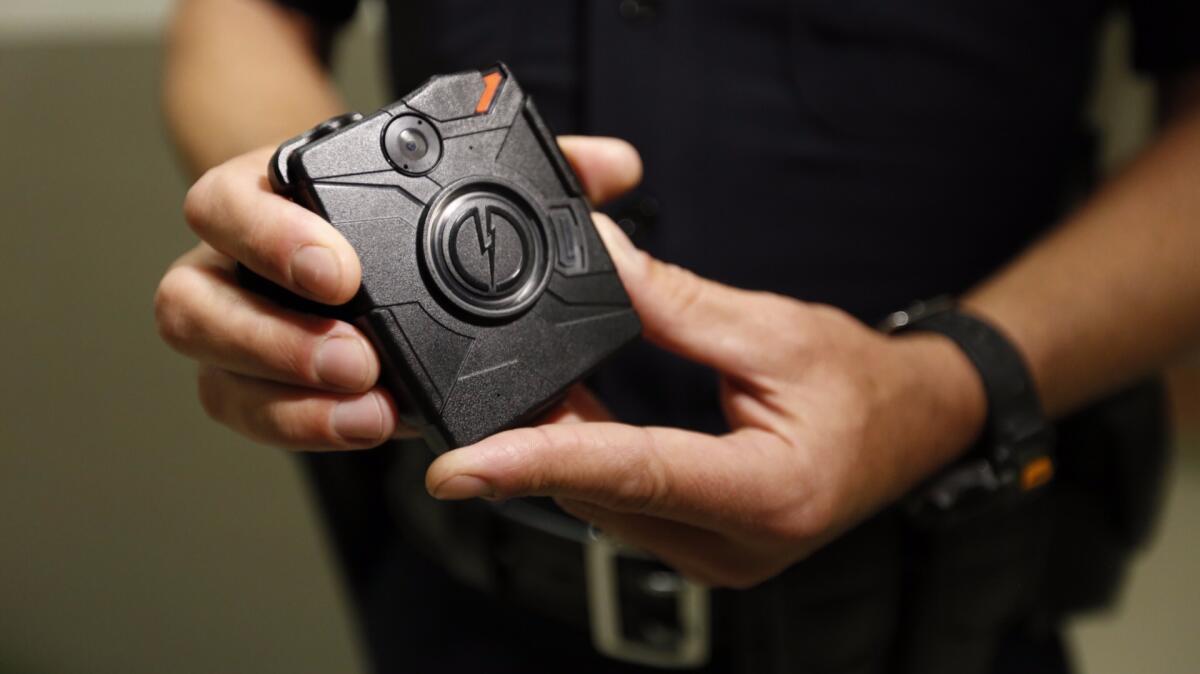Deal to spend $57.6 million on LAPD body cameras clears key hurdle

- Share via
Los Angeles city lawmakers broke through a lengthy political logjam over police body cameras on Tuesday, clearing the way for a City Council vote on the costly initiative.
After six months of delays, the council’s Public Safety Committee unanimously backed the plan for purchasing thousands of devices from Scottsdale, Ariz.,-based Taser International, a move that would make the LAPD the largest law enforcement agency in the nation to use the devices on such a widespread scale.
A full council vote is scheduled for Wednesday. Councilman Joe Buscaino, who previously warned that the program would divert funds from other public safety needs, said he now is “comfortable” with the initiative and ready to move forward.
Police officers want the cameras, Buscaino said, so they can show the public “the professionalism, the courtesy they employ every single day.”
Interested in the stories shaping California? Sign up for the free Essential California newsletter »
Critics of the program were less enthusiastic, saying the LAPD’s policy for releasing footage will undermine efforts to improve police oversight. The American Civil Liberties Union of Southern California has opposed the program for months, criticizing the LAPD’s decision not to publicly release body camera footage without a court order. Catherine Wagner, an attorney for the civil liberties group, told lawmakers Tuesday that they should withhold funding until the policy is revised.
“The LAPD’s program, while perhaps the biggest ... is not even close to being the best,” Wagner said.
The vote was the latest step in a sometimes rocky review process for the camera program, which is backed by Mayor Eric Garcetti and his appointees on the Board of Police Commissioners.
Last year, city lawmakers began voicing dismay over the program’s cost — $57.6 million over five years — and raised questions about whether the Police Department got the best deal possible. Competing technology firms complained they were unfairly left out of the LAPD selection process, which relied in part on a competitive search conducted by the much smaller Kern County Sheriff’s Department.
As a result, city lawmakers postponed a crucial vote to approve the body camera program, delaying the rollout for months and derailing Garcetti’s pledge to put a camera on nearly every officer by the end of this year.
LAPD officials do not expect to finish outfitting 7,000 officers with cameras until the fall of 2017, at the earliest.
See the most-read stories this hour »
Body cameras have been hailed as a key tool for improving police accountability and building community trust in law enforcement. Garcetti unveiled his initiative in late 2014, amid nationwide protests over how police use force, particularly against African Americans.
The LAPD already has about 860 cameras, purchased with private donations. Last year, the department negotiated a contract with Taser to provide thousands more, along with replacement equipment, digital storage of the recordings and thousands of Tasers.
The council was set to vote on the $31.2-million contract in December. But city lawmakers balked at the last minute, saying they were worried that the technology would require scores of additional LAPD officers to review camera footage and monitor the use of the devices. The LAPD later revised its plan to include more civilian staffers.
The concerns continued in April, when Councilman Mitch Englander questioned whether the LAPD should start the selection process over and accept new bids from camera manufacturers. Police commissioners defended the process, saying the initiative was too important to delay further.
Englander, who heads the council’s Public Safety Committee, asked for a fresh analysis of the body camera market. In response, the department surveyed several camera manufacturers to determine whether they had made upgrades to their devices and storage systems. After receiving information from 18 companies, LAPD officials determined that Taser still was their preferred choice.
“I’ve been a passionate proponent, but also wanted to make sure we did this correctly,” Englander said Tuesday.
Representatives of a competitor to Taser disagreed, saying the city should have carried out a more open search for camera technology.
”There was little transparency in the process,” said City Hall lobbyist Adena Tessler, whose client is Hollywood-based Wolfcom camera manufacturer. “Nobody should be doing this in a city this size without an open bid process.”
david.zahniser@latimes.com | Twitter: @DavidZahniser
kate.mather@latimes.com | Twitter: @katemather
ALSO
Michael Jackson stockpiled pornography at Neverland Ranch, documents show
Riordan, former L.A. City Council candidate fined by Ethics Commission
Driver sentenced after pleading no contest in deadly Christmas concert crash
More to Read
Sign up for Essential California
The most important California stories and recommendations in your inbox every morning.
You may occasionally receive promotional content from the Los Angeles Times.











